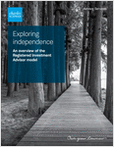The U.S. Court of Appeals for the Seventh Circuit, in a decision written by Judge Richard A. Posner, has affirmed a $726,000 award in favor of an insurance company – that included its attorneys’ fees – in a case involving the insurer’s challenge to so-called “stranger-originated life insurance” (“STOLI”).
The Case
As Judge Posner explained:
Mavash Morady, an insurance agent, contracted with Ohio National to sell life insurance policies issued by it. Douglas Davis, a lawyer formerly licensed in California, approached elderly persons and persuaded them to become the nominal buyers of the policies, with Ms. Morady as the insurance agent. Mr. Davis promised to pay these persons small amounts of money for obtaining policies, and in exchange for the promises they filled out applications for life insurance.
A typical buyer was Charles M. Bonaparte, Sr. His application was accepted, the policy was issued to him, and the defendants [Ms. Morady and Mr. Davis] had him place the policy in the Charles M. Bonaparte Sr. Irrevocable Life Insurance Trust (which they created), designating the trust as the policy’s owner and beneficiary. This was an irrevocable trust, with Mr. Davis as trustee. The defendants paid (in the name of the trust) the premiums on the insurance policy; Mr. Bonaparte paid nothing.
The defendants created trusts in the names of the insured to conceal from Ohio National the fact that they rather than the insured controlled the policy and that they planned to sell it as an investment.
A few weeks or months after the creation of each trust, Mr. Davis would have the nominal buyer of the policy (such as Mr. Bonaparte) assign the beneficial interest in the trust (and, therefore, in the policy) to a company owned by another defendant, Paul Morady, Ms. Morady’s husband. Mr. Morady would make the initial premium payments to Ohio National but then resell the beneficial interest in the trust to an investor who hoped that the insured would die soon, for on the insured’s death the investor would obtain the proceeds of the policy because the investor was its beneficiary. Having acquired the beneficial interest in the policy, the investor would pay the remaining premiums as they came due.
Ohio National would not have sold the policies to the persons so recruited had it known that the premiums would be paid or financed by an unrelated third party (an investor) in the expectation that the policy would be transferred to the investor. The company’s contracts with its agents, such as Ms. Morady, required them to conform to its business-practice advisories, which contained an “absolute prohibition against participation in any type of premium financing scheme involving an unrelated third party” – an exact description of this STOLI scheme.
Ohio National filed a lawsuit and the U.S. District Court for the Northern District of Illinois awarded it damages of $726,000 – amounting to the premiums that it had received plus its litigation costs – against all the defendants but Stephen Egbert, an investor to whom the district court awarded $91,000, which was the amount that he had paid Ohio National in premiums on a particular insurance policy.
The district court found that Ms. Morady’s conduct constituted fraud and a breach of her contract with Ohio National and awarded the insurance company as damages the $120,000 that she had received as commissions as an insurance agent for the company. She had admitted knowing that the premiums on the disputed policies would be paid by her husband, who had no interest in the continued life of the insureds and who had planned to sell the policies to investors. Such premium-financing arrangements were forbidden by her contract with Ohio National.
Damages awarded to Ohio National were not limited to Ms. Morady’s fraudulent conduct, but were based more broadly on the tort of civil conspiracy: The district court found that the defendants conspired to violate Illinois’ common law prohibition against insurance contracts procured by persons who did not have an insurable interest.
The defendants (other than Mr. Egbert) appealed to the Seventh Circuit, and Ohio National appealed the award to Mr. Egbert.










 Copyright © 2024 ALM Global, LLC. All Rights Reserved.
Copyright © 2024 ALM Global, LLC. All Rights Reserved.